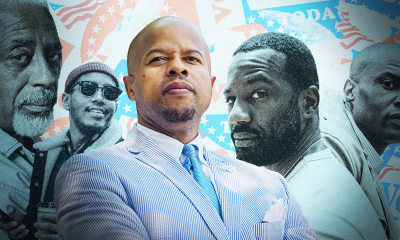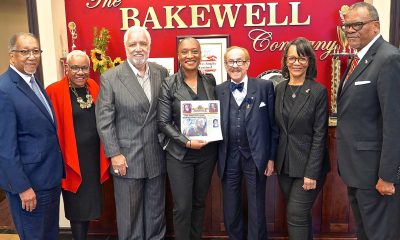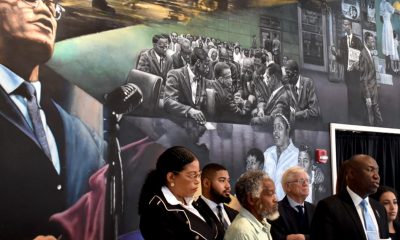Health
Police Violence Coverage Takes Mental Toll
By Jazelle Hunt
NNPA Washington Correspondent
WASHINGTON (NNPA) – Police have killed at least 369 people in the first four months of 2015, with 103 Black Americans – 28 percent – making up a disproportionate number of the victims, according to Ferguson protester project, Mapping the Police.
But a growing number of medical experts say the damage inflicted extends far beyond the number of actual victims.
Unarmed Black male victims are currently en vogue in the media, with images of the victims’ last moments on loop hour after hour. And each incident adds a fresh layer of offense – from Deputy Robert Bates in Tulsa, Okla., who was charged with the manslaughter of Eric Harris but allowed to vacation in the Bahamas after the court hearing, to Officer Dante Servin in Chicago, found not guilty for Rekia Boyd’s murder because the prosecutor deliberately filed lesser, inappropriate charges.
“The repetitive nature of this, the fact that this is chronic…. Chronic experiences of racial discrimination, and I’d include vicarious discrimination, can influence mental and physical health outcomes,” says Amani Nuru-Jeter, associate professor of public health at University of California-Berkeley and researcher on racial health disparities. “I’m not saying it’s the same as post-traumatic stress disorder, but we do some similarities in how people cognitively respond.”
Other depressive or schizophrenic symptoms (such as paranoia or emotional numbness) can emerge, as well as physical health problems such as cardiovascular disease. On an individual level, racism in general has gradual, but potentially life-shortening effects on the mind and body.
These effects can be even more acute for those who make their Blackness the most important part of their self-identity, and/or those who internalize the racism against them.
“We found that it’s associated with ‘cellular aging,’” Nuru-Jeter says, referring to a body of public health research to which she has contributed. “We used a measure called telomeres, which are biological indicators of the age of the cells in our bodies and indicate premature biological aging.”
On a communal level, being under the threat of police violence backed by the authority of the local, state, and sometimes national government, is enough of a burden on its own. When this oppression stretches from the mundane to the life threatening – such as the discriminatory fines and the National Guard deployment in Ferguson after Officer Darren Wilson was not indicted – it is easy for Black communities to fall into a sense of hopelessness.
The more a community feels bound by the same identity (be it racial, socioeconomic, or otherwise), the more deeply the effects of chronic racial discrimination are felt.
“There’s also collective racial identity. There’s [an academic field] called social capital…and in that, there’s a concept called bonded social capital,” Nuru-Jeter explains. “Identity can increase solidarity. For example, what we saw in Ferguson was an outcry of, ‘We’re tired of being treated like this, we’re raising our voice to say Black lives do matter to us.’”
There’s also the matter of images. Some media outlets have routinely reported on the victim’s past crimes and encounters with the justice system, and used either an old mugshot or image of the victim dead or dying to accompany their coverage.
Some outlets have come under fire for what many consider insensitive treatment of the deceased. One Change.org petition specifically asks The Washington Post to stop using victim mugshots in covering police violence. After some outcry on social media, CNN began to air a blurred version of the footage of Walter Scott’s killing, as captured by bystander, Feidin Santana.
Nuru-Jeter points to neuroscience research involving FMRI scans (which map both brain activity and structure) that show how images or films can create a vicarious experience for the viewers.
“Some of these studies show that the same parts of the brain light up compared to when people have their own experience. I’m extrapolating here, but the suggestion is [there],” she says, especially for people who see themselves and their loved ones represented in the victims on TV.
As police killings continue to be a hot topic in the news – and as police departments continue to use lethal force in their interactions with civilians – it is likely that media coverage of this violence will continue. Nuru-Jeter highlights two ways to protect one’s self and loved ones from the mental toll of these tragedies.
First, having strong racial identity can be a buffer, if it is experienced in a proud way. By focusing on Black pride, and drawing strength from the positive aspects of the Black American experience, individuals and communities can balance out the painful parts.
Finally, supportive people and systems are key for overall wellbeing.
“What happens when we see a constant message of devalued Black life in society? One way people can cope with this is to share the experience, and not hold it in,” she says. “Even if you’re not getting individual support, simply being a member of a group [as in protest] can help. ‘There’s strength in numbers’ counts as a cliché, but I think the evidence is there to support that.”
###
Bay Area
Mind, Body, and Spiritual Well-Being for Women Addressed in NAACP Forum in Oakland
The Women In The NAACP Oakland Branch is proud to announce the upcoming “Total You – Mind, Body, and Spirit Women’s Health Forum” scheduled for April 27 at Acts Full Gospel Church. Running from 9 a.m.-2 p.m. at 1034 66th Ave., this forum aims to provide an empowering platform for women to engage in discussions, gain knowledge, and access resources pertaining to their health and well-being.
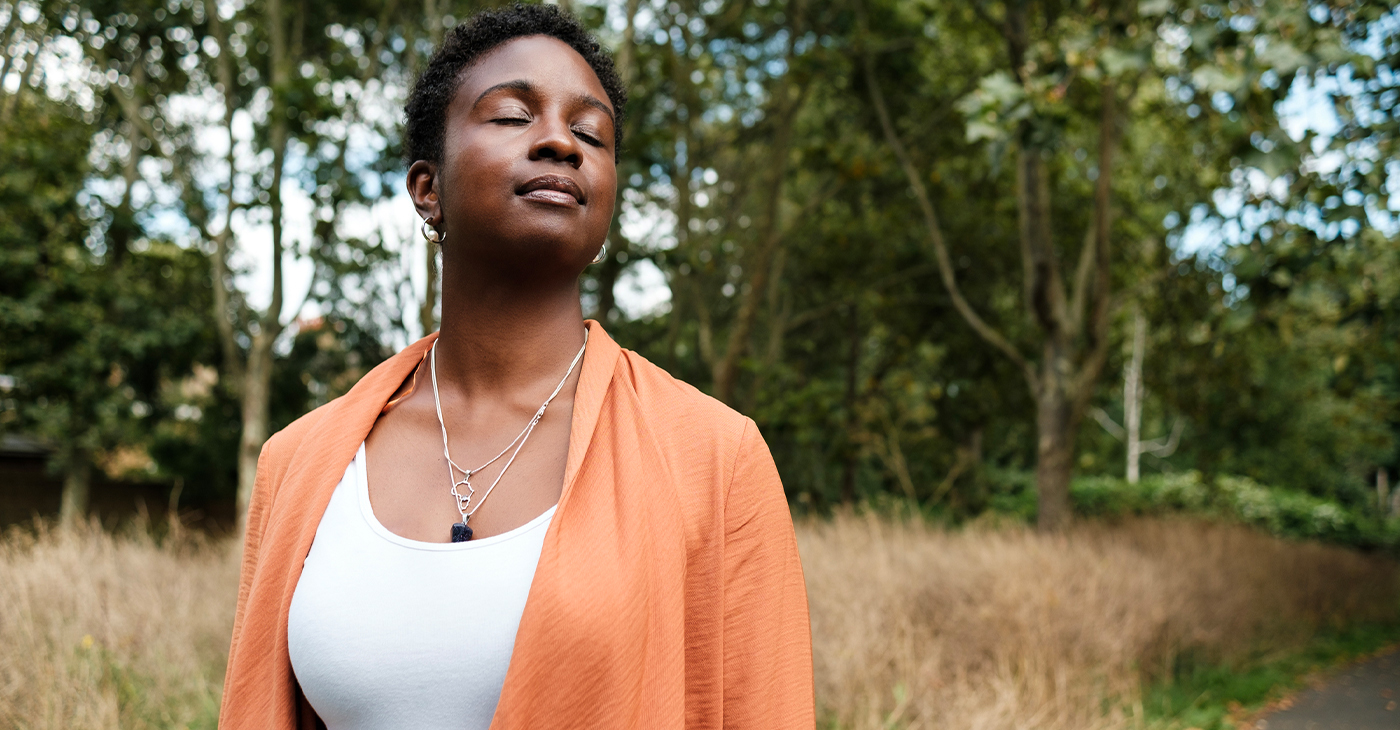
Special to The Post
The Women In The NAACP Oakland Branch is proud to announce the upcoming “Total You – Mind, Body, and Spirit Women’s Health Forum” scheduled for April 27 at Acts Full Gospel Church.
Running from 9 a.m.-2 p.m. at 1034 66th Ave., this forum aims to provide an empowering platform for women to engage in discussions, gain knowledge, and access resources pertaining to their health and well-being.
The forum will feature renowned experts, healthcare professionals, and advocates from Genentech, John Muir Health, Sutter Health of The East Bay, Kaiser Permanente, and the Alameda County Public Health Department.
Our expert panel will address various aspects of women’s health, including physical, mental, and emotional well-being, and healthy relationships. The forum will encompass a wide range of topics such as breast cancer, menopause, reproductive health, nutrition, mental health awareness, preventive care, and much more.
Participants will have the opportunity to attend informative sessions, interactive workshops, and panel discussions led by experts in their respective fields. Additionally, there will be wellness activities, screenings, and informational booths offering valuable resources and support.
This forum is open to women of all ages and backgrounds, encouraging inclusivity and diversity in the conversation surrounding women’s health. Whether you’re seeking information for yourself, a loved one, or simply looking to connect with other women, this event promises to be enlightening and empowering.
For more information and to register for the Total You Women’s Health Forum, please visit https://www.naacpoakland.org/ or contact Dr. Delores Thompson. WIN chairwoman at (510) 328-3638.
The Women In The NAACP Oakland Branch is dedicated to empowering women, and young teen girls. We look forward to your participation in this important event.
To register, go to https://www.naacpoakland.org/events/the-total-you-womens-health-forum
Alameda County
Oakland Conducts Its Biennial ‘Point in Time’ Homelessness Count
Oakland, along with other cities in Alameda County, conducted their biennial ‘Point In Time’ census count on Feb. 1 to gain a thorough understanding of the size and dispersion of the homeless population in the region. The Point In Time (PIT) count is federally required by the Housing and Urban Development Department as a requirement to receive funding and resources to tackle homelessness in the area.
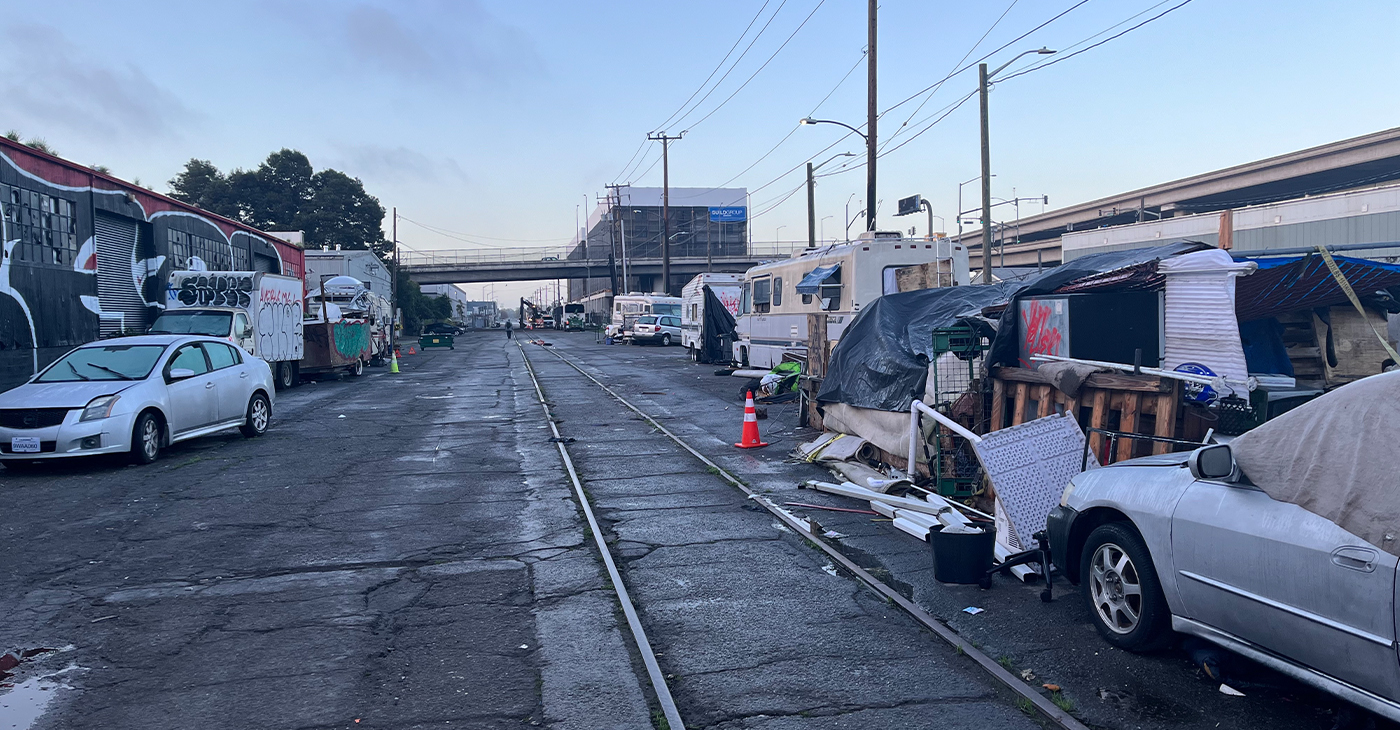
By Magaly Muñoz
Oakland, along with other cities in Alameda County, conducted their biennial ‘Point In Time’ census count on Feb. 1 to gain a thorough understanding of the size and dispersion of the homeless population in the region.
The Point In Time (PIT) count is federally required by the Housing and Urban Development Department as a requirement to receive funding and resources to tackle homelessness in the area.
David Modersbach, Grants Manager of Alameda County Health Care for the Homeless program, said that the methodology this time around was different, as this count had a much more personal “lived experience” aspect that previous counts did not have.
In 2022, the county relied more on statistical extrapolation and assumptions, but this year’s survey questionnaires allowed for details on substance abuse issues, how long someone has been living without proper housing, what resources people are in need of and much more.
“[The PIT count is] a critical opportunity for the county, Continuum of Care, and cities to understand the magnitude of homelessness in Alameda County. [The count] enables us to better allocate resources and implement effective programs to tackle this issue head-on in a compassionate and inclusive way,” Modersbach said.
St. Mary’s Center was one of the many meeting hubs across the county that hosted volunteers and community officials the morning of the count. The organization has been deeply involved in the effort to provide resources for unhoused people and others in need.
St. Mary’s is a nonprofit in West Oakland that helps seniors and preschool families with food and housing. Last year, the organization helped about 50 seniors find housing after they had fallen on hard times.
Sharon Cornu, executive director of St. Mary’s, said a lot of the older couples and individuals that come into the center have borne the brunt of the skyrocketing cost of living in the Bay Area. The most recent influx of seniors St. Mary’s has seen coming in for help has been made up of people who were evicted when the COVID-19-related moratorium on rent payment ended.
“Seniors are the fastest growing segment of the unhoused and the incredibly high cost of housing is driving them to the streets,” Cornu said.
Among the volunteers were workers with Operation Dignity, a nonprofit organization that helps veterans and those living on the street find shelter, transitional housing and supportive services.
“These are our stomping grounds,” Ivan Magana, program manager for Operation Dignity said.
Magana stated that his team was extremely familiar with the people residing in the encampments they were conducting the count in since Operation Dignity made many visits to these areas while doing community outreach. He said they had even informed some of the unhoused people they knew about the count a few days prior so they would not be alarmed when the enumerators showed up early in the morning to conduct the count.
Not everyone got the memo though, as the volunteers encountered an almost violent situation around the 6 a.m. when a young woman living in a bus yelled at the Operation Dignity workers to leave her alone.
Luckily, the three-year experience Mangana has working with Operation Dignity and his knowledge of therapeutic health services, equipped him with the techniques needed to deescalate the tension. The woman soon realized who the volunteers were and apologized, he said.
Another volunteer and Operation Dignity worker, Yolanda Kirkpatrick, noted that she was initially hesitant because of the early schedule. She felt the time deterred others from participating, too.
Her prediction would come true as the hours went on and they continued to walk along 24th St in downtown Oakland and there was very little activity on the streets.
The volunteers shared similar sentiments. Although the community the people they were engaging for the count and surveys encounter tend to distrust outsiders, the PIT count was necessary for the city to receive the appropriate level of federal funds to address a crisis that is spiraling out of control in California.
A full analysis and report of the count will be made available in the summer.
Community
For Cervical Cancer Month, Medical Community Focused on Education
January was Cervical Cancer Awareness Month. Physicians, advocates and others in the medical community commemorated the month by raising awareness about a form of cancer they say is highly preventable and treatable. Cervical cancer is caused by a virus called the human papillomavirus (HPV) and it develops slowly over time but can be prevented with proper care in girls as young as 13 years old.

By Magaly Muñoz
January was Cervical Cancer Awareness Month.
Physicians, advocates and others in the medical community commemorated the month by raising awareness about a form of cancer they say is highly preventable and treatable.
Cervical cancer is caused by a virus called the human papillomavirus (HPV) and it develops slowly over time but can be prevented with proper care in girls as young as 13 years old.
Sonia Ordonez, an OBGYN and gynecology surgeon at Kaiser Permanente, stated that as soon as people with cervixes reach the maturity reproductive age, they should start taking preventative measures like getting the HPV vaccine. The vaccine involves a series of two-doses for people aged 9 through 14 or three-doses for people 15 through 45 years old.
“I see a lot of young women who can’t remember or may not have gotten [the vaccine] when they were younger, or maybe got one, but we can give them the series of vaccines and restart at any point in time,” Ordonez said.
She said that cervical cancer is not the only cancer caused by HPV. Strains of the virus can also lead to throat, anal and penile cancers.
Screening is also an effective way to check for cervical cancer and should be done every three years after someone turns 21, doctors recommend. It is best to start as early as possible to catch occurrences early.
Ordonez said that this cancer is also more likely found in people of color and has led to more deaths overall.
A Mayo Clinic article published last month stated that Black women are more likely to be diagnosed and die of cervical cancer, compared to White women in the U.S.
2,000 Black women are diagnosed every year with cervical cancer and 40% die as a result.
“This disparity is not due to genetic differences among White, Black or Hispanic women, but rather related to systemic racism, access to healthcare and socioeconomic factors,” Dr. Olivia Cardenas-Trowers, a Mayo Clinic urogynecologist, said in the article.
Ordonez stated that immigrant women are also highly susceptible to the cancer, as many Latin American countries may not have accessibility to screenings or lack of insurance makes it harder for them to get tested.
Hispanic women are 40% more likely to be diagnosed with cervical cancer, and 30% more likely to die from it, as compared to non-Hispanic White women, according to the Office of Minority Health.
Family medicine physician, Joy Anyanwu, stated that the pandemic contributed to hesitancy about getting cervical cancer screenings among some women. Other factors are people’s aversion to vaccines, parents not wanting to believe that their children are or will become sexually active, and doubt about the overall effectiveness of the vaccine.
“The vaccine is very safe — over 97% effective in preventing cervical cancer,” Anyanwu said. “Even if you aren’t having sex, the earlier you start would actually help.”
Anyanwu said she understands that parents might not want to ask questions about their children’s reproductive health, but it’s a mindset that can be a barrier to having important conversation about prevention or care.
To keep families their families and communties healthy, the doctor emphasized that people should prioritize keeping up with their vaccine series and going to screenings every year.
-

 Community2 weeks ago
Community2 weeks agoFinancial Assistance Bill for Descendants of Enslaved Persons to Help Them Purchase, Own, or Maintain a Home
-

 Activism4 weeks ago
Activism4 weeks agoOakland Post: Week of April 3 – 6, 2024
-

 Business2 weeks ago
Business2 weeks agoV.P. Kamala Harris: Americans With Criminal Records Will Soon Be Eligible for SBA Loans
-

 Community2 weeks ago
Community2 weeks agoAG Bonta Says Oakland School Leaders Should Comply with State Laws to Avoid ‘Disparate Harm’ When Closing or Merging Schools
-

 Activism3 weeks ago
Activism3 weeks agoOakland Post: Week of April 10 – 16, 2024
-

 Community2 weeks ago
Community2 weeks agoOakland WNBA Player to be Inducted Into Hall of Fame
-

 Community2 weeks ago
Community2 weeks agoRichmond Nonprofit Helps Ex-Felons Get Back on Their Feet
-

 Community2 weeks ago
Community2 weeks agoRPAL to Rename Technology Center for Retired Police Captain Arthur Lee Johnson





